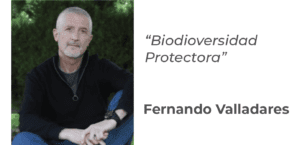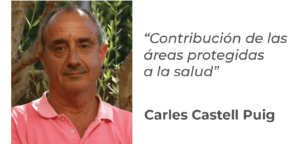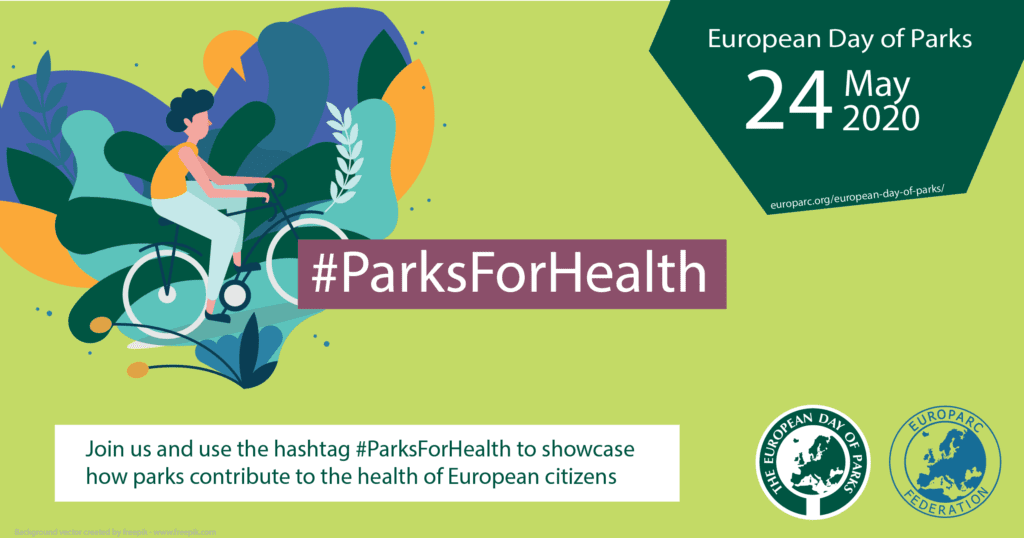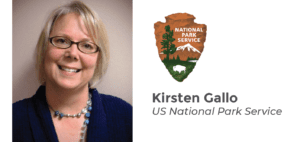[webinar in Spanish] Salud, Biodiversidad y Áreas Protegidas
El 22 de mayo os invitamos a celebrar con nosotros 2 fechas importantes: el Día Internacional de la Diversidad Biológica y el Día Europeo de los Parques. En este seminario web, co-organizado con EUROPARC España y OAPN, veremos el importante vínculo entre una naturaleza sana, para una sociedad sana.
Salud, Biodiversidad y Áreas Protegidas
- 22 Mayo 2020
- 13:00 CEST
- La participación es gratuita pero es necesario registrarse. Regístrate aquí: https://webinarsaludybiodiversidad.gr8.com/
Las áreas protegidas siempre han cumplido una función esencial de protección de la salud de la humanidad a través de la conservación de la naturaleza. La situación que estamos viviendo en todo el mundo con la aparición de la pandemia del COVID-19 nos ha hecho a todos más conscientes de la importancia de esta función esencial.
Existen crecientes evidencias científicas de que las experiencias en la naturaleza son fuente de salud física y mental – desde los primeros trabajos procedentes de la psicología ambiental sobre el efecto restaurador de la naturaleza, hasta los estudios más recientes sobre salud percibida y entornos naturales y de beneficios añadidos a la realización de ejercicio físico en entornos naturales.
En este webinario se darán claves desde el ámbito científico que nos ayuden a trasmitir mejor esa función, así como ejemplos concretos ya en marcha que ilustran que no solo es posible, sino muy deseable, que las áreas protegidas trabajen en alianza con el sector de la salud para mejorar sus funciones sociales.
Bárbara Pais, de la Federación EUROPARC, abrirá la sesión con un vistazo a la celebración del Día Europeo de los Parques en 2020, mientras que Marta Múgica, de EUROPARC España, presentará el programa Sociedad y Áreas Protegidas y enmarcará la importancia de los Parques para nuestra salud.
Ponentes invitados:
Carles Castell Puig, biólogo y doctorado en ecología, trabaja en la Diputació de Barcelona. Es experto en conservación de la naturaleza, y tiene una larga carrera en la planificación y desarrollo de la interfaz entre las personas y la naturaleza. Desde 2016, Carles es también miembro del grupo de trabajo sobre Salud y Áreas Protegidas de la Federación EUROPARC.
Este webinario está co-organizado con EUROPARC España y el Organismo Autónomo de Parques Nacionales, en celebración del Día Europeo de los Parques.
[webinar] Radical Transformational Leadership for Protected Areas & Climate Change
Radical Transformational Leadership for Protected Areas & Climate Change
- 18th May 2020
- 15:30 CEST
- Participation is free, register here: webinartransformationalleadership.gr8.com/
Climate, society, natural spaces: the world is calling for a meaningful change. Europe´s protected areas know the urge to adapt, but these transformations depend on our capacity to design approaches that can shift the status quo. As in our last EUROPARC webinars on climate change (check here and here), we looked at practical tools & methodologies for Parks, in this webinar, we invite you to look at the personal dimension of transformation.
Radical Transformational Leadership is a set of tools and templates that allow us to tackle complex problems, including climate change and conservation of natural protected areas. The framework was developed over the last three decades by Dr. Monica Sharma and her team and tested world-wide in the healthcare and human rights sectors. Through this webinar, we introduce the environmental applications of the framework, with first-hand experiences from the USA and Spain.
Our special guests show us environmental applications of the Radical Transformational Leadership framework and illustrate how it can help us develop meaningfully our work in protected areas.
Marta Múgica from EUROPARC Spain will open the session, to show us the importance of sharing knowledge among Protected Area professionals, for co-adaptation to climate change. Kirsten Gallo from the US National Park Service will present her work in natural parks based on Transformational Leadership framework, over the last 10 years, while Conchi Piñeiro from Altekio (ES) will present her recent experience as trainee and early applications of this work to climate change.
The webinar, co-organised with FUNGOBE and EUROPARC Spain, will be held in English and moderated by Bárbara Pais. We aim for a truly interactive experience, so do join us with your camera and microphone.
Kirsten Gallo, US National Park Service
When Kirsten Gallo was a little girl, she wrote a letter to the deer and bunnies in her back yard promising to always take care of them. Decades later, she is taking care of deer, bunnies and so much more as the head of the U.S. National Park Service Inventory and Monitoring Division. She held a variety of positions in the U.S. Forest Service and the National Park Service conducting natural resource monitoring and stewardship of public lands. She holds a doctorate degree in Ecology and has dedicated her career to conserving natural resources and demonstrating interdependence between humans and our environment using transformational leadership techniques.
Conchi Piñeiro, Altekio
Conchi Piñeiro is passionate about how individual, collective and societal changes are interlinked especially in relation with nature. That’s why as group facilitator in Altekio, she enables groups and organisations to find creative ways to respond to our challenges such as climate change, in order to achieve an eco-social transformation. She is also a researcher and trainer on Sustainability, with a PhD in Environmental Education.
Chalk Bed Marine Conservation: lessons from the UK
A case study from the Cromer Shoal Chalk Beds Marine Conservation Zone (MCZ), featured in our latest Protected Areas In-Sight Journal, that is available in English, German and French.
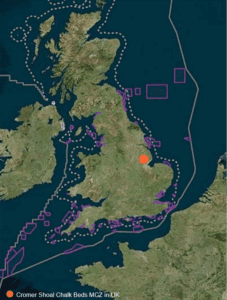
Cromer Shoal Chalk Beds MCZ in UK. Copyright JNCC.
Article issued by Fiona Tibbitt – Marine Lead Adviser at Natural England
Natural England (NE) provides conservation advice to regulators of fishing activities in English waters, with a special focus on Marine Protected Areas.
Cromer Shoal Chalk Beds MCZ in North Norfolk was designated in 2016 under UK legislation The Marine and Coastal Access Act (MACAA) of 2009. The aim of MACAA 2009 is to protect rare, threatened and representative habitats, species and geological features of national importance. This legislation is unique – it considers ecological and geological importance as well as socio-economic impacts. Local communities and sea bed users had a say in the designation process and those views were listened to. A decade later, we are much closer to a well-managed, ecologically coherent network of Marine Protected Areas, but there’s still work to do.
Chalk beds are important because their cracks and crevices provide refuge for wildlife, especially juvenile invertebrates and fish. It is also a source of substrates for burrowing organisms. Any irreparable structural damage is therefore significant and may require some sort of management.
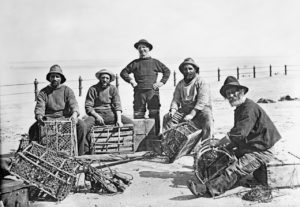
Historical Cromer Crab and Lobster fishery.
Copyright National Maritime Museum
The assessment of fisheries impact to create management measures in Cromer Shoal Chalk Beds MCZ is now underway. But when the site was designated, we had limited evidence. Fisheries activity levels were unclear and the position of Natural England (NE) was that the most intensive fishing activity – ‘potting’ – was small scale, selective and low impact. Based on the best available evidence at that time, implementation of management measures was unlikely and this was communicated widely.
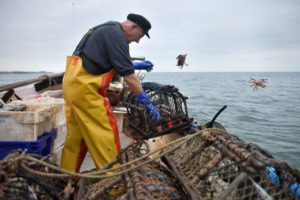
Cromer Crab and lobster fishery today. Copyright Romsey Advertiser.
Currently, new anecdotal evidence shows that there may be impacts on chalk habitats from some fishing activities after all. But given the rarity of this habitat, we still need more evidence to improve our understanding.
Chalk Bed Marine Conservation: reconciling the regional heritage with sustainable management
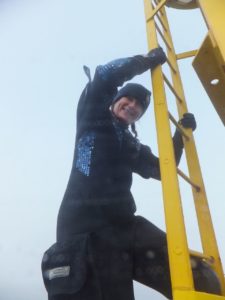
Fiona Tibbitt
The crab and lobster fishery started in the 19th century and is fundamental to the character, cultural heritage and economy of North Norfolk, so it is essential that any management is risk-based and proportionate. The application of the ‘precautionary principle’ is required where evidence is lacking and NE advise an ‘adaptive management approach’. This means, with more evidence, management can be modified accordingly.
NE are working closely with the conservation authorities and the Agents of Change Project, Marine Conservation Society at the Essex University, fisheries representatives and Seasearch to gather more evidence. We have conducted dive and drone surveys, workshops and discussions to improve understanding of activities and impacts on chalk. Novel techniques are being used, e.g. 3D Photogrammetry to improve our scientific understanding and provide tools for exciting marine visualisation opportunities for education and outreach purposes, such as Virtual underwater tours.
Community Voice Method workshops with fishers outlined plans for more to be done in terms of gathering evidence and communicating the findings. Plans for a fishers and regulators forum are evolving so fishers are included in the management and feel a sense of ownership. Local communities also need to be involved as they can act as local monitors, and resources for enforcement will always be finite.
The Community Voice Method is an innovative, research-based approach to fostering effective public conversations about important local issues. It aims to foster more inclusive, informed, and ongoing civic dialog in communities facing changes to their landscapes and resource-based livelihoods.
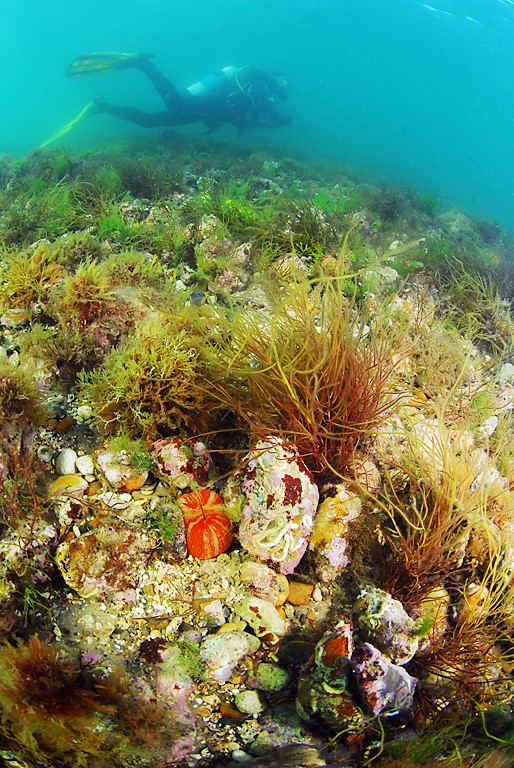
Diver on Cromer Shoal MCZ. Copyright Sam Bean.
Further work to help build trust between us and the local community is needed with better and regular communications. Sustainability is at the heart of management of Marine Protected Areas but both the marine environment and coastal communities need to be addressed, so they can thrive together.
This approach is being watched closely by others as there are implications for other chalk sites elsewhere. It will be precedent setting and we need to get it right.
So can we consider it a success?
We have achieved adaptive, proportionate and effective management. There is a thriving and sustainable local fishery with other sustainable marine activities and an engaged local community protecting their MCZ for future. With our partners, we help gather science and evidence to assess the condition of our MCZ in order to better inform the management and help to modify it accordingly. Finally, the public are engaged in innovative ways so they connect, value and respect the Cromer Shoal Chalk Beds MCZ. There’s still much work to do, but we’ll get there.

Fiona Tibbitt – Marine Lead Adviser, Natural England
